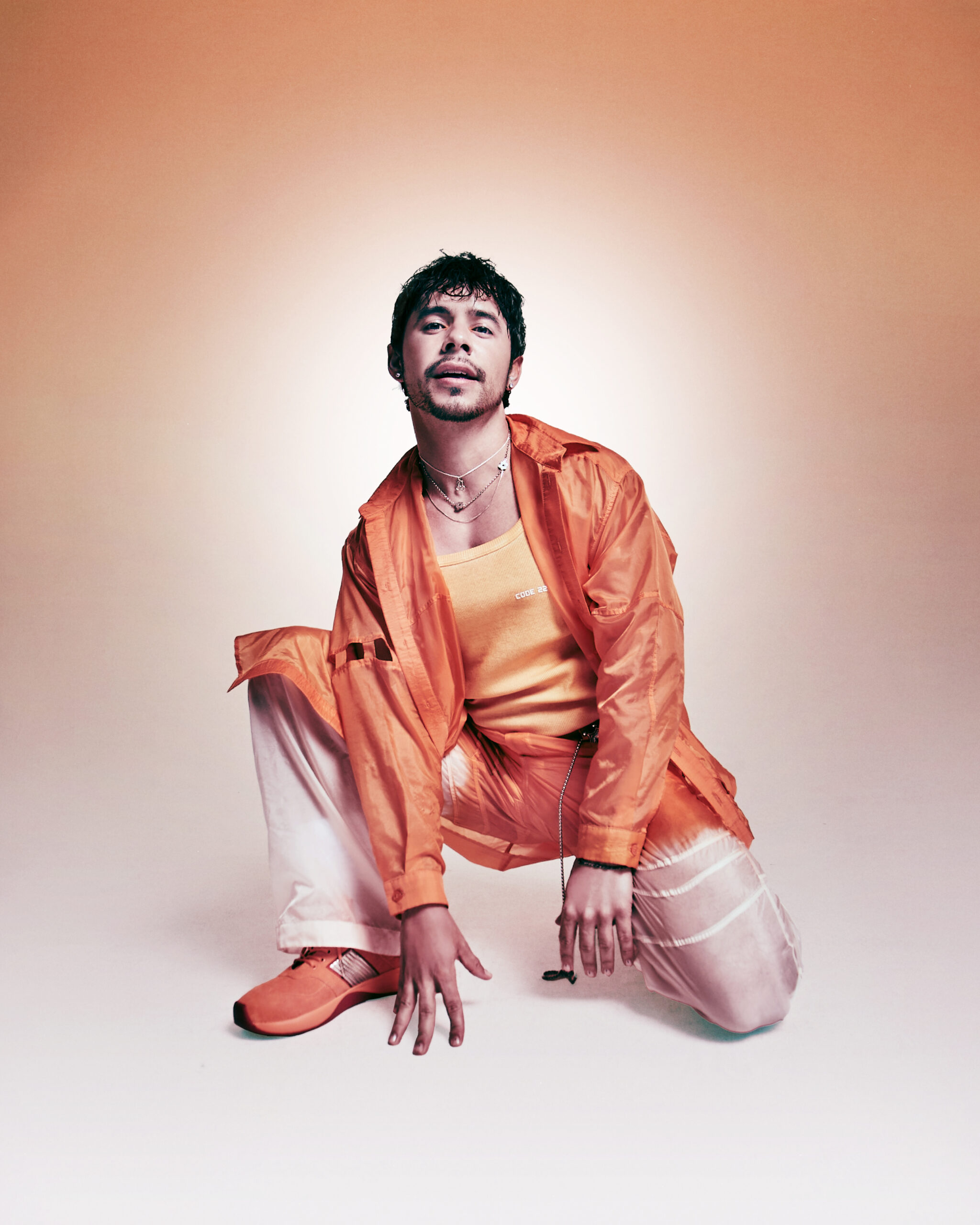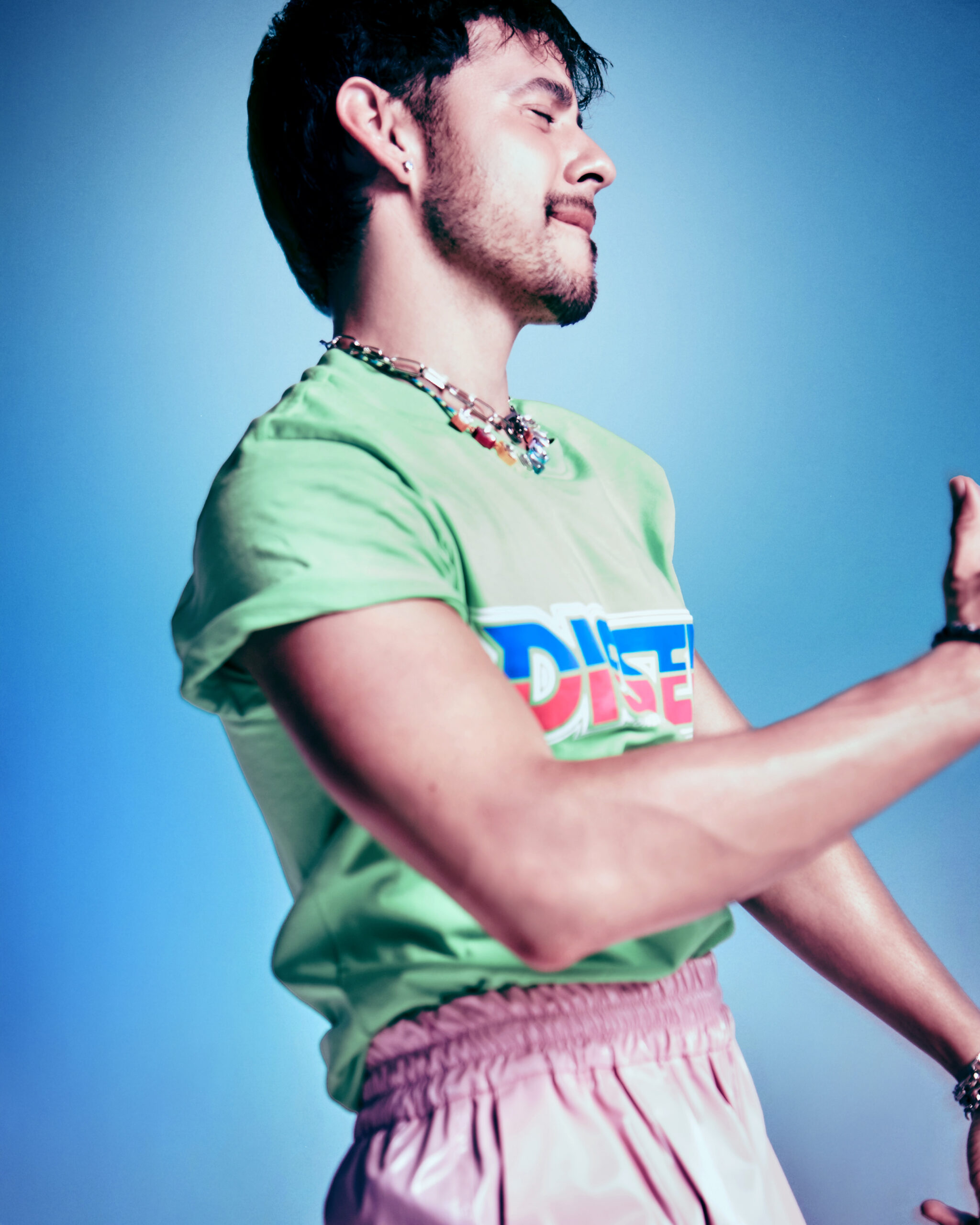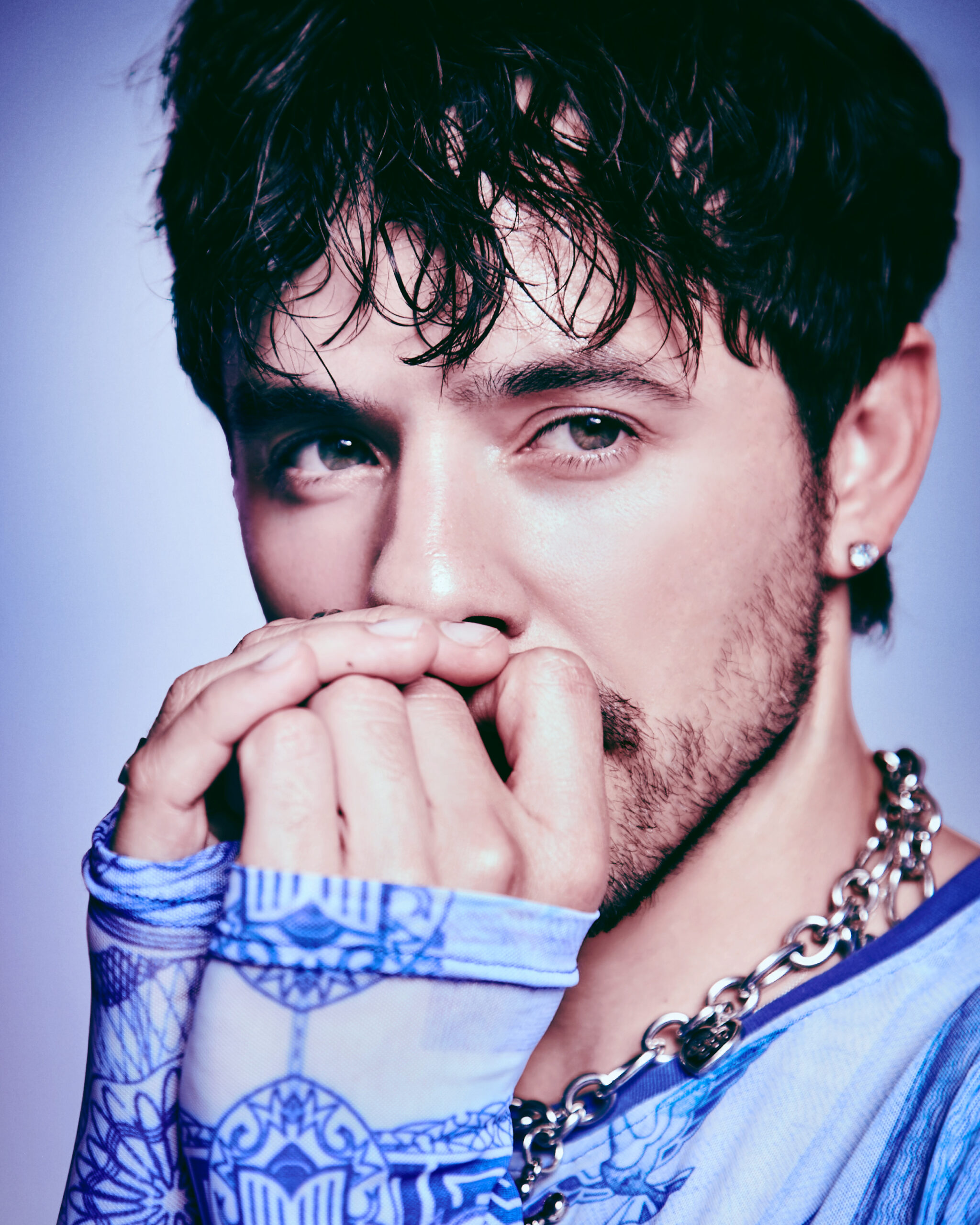
David Archuleta’s “Freedom” Moment
In Conversation with Loren Allred
Photos / Savanna Ruedy
Styling / Phil Gomez
Glam / Francie Tomalonis
Loren: Let’s get into it. So the last time I saw you, we were performing together during Pride Month in New York. And I don’t know if you remember this, but as you were introducing me on stage, you said that we grew up very similarly. And I’m not sure if many people knew what you meant, but of course we know what that is. We’re both ex Mormons.
David: My gosh… That’s so wild to still hear ex-Mormons.
Loren: I know. It sounds so negative.
David: I feel like it’s like a swear word.
Loren: Exactly. Yeah. Of course I grew up watching you as kind of the poster child for Mormonism and when you came out I reached out to you on Instagram and now we’re friends in real life and we have gone out to gay clubs. We’ve partied together. and I know for myself when I left the church I almost felt like I was playing catchup with my peers. Do you ever feel like you’re making up for lost time and just taking it all in?
David: My gosh… Yes. I almost feel I’m a kid, like a little boy because I’m experiencing things for the first time and it’s so exciting and exhilarating. I’m allowing myself to just be free.” I feel like I have to act in a certain manner and… be like, if I act too much, I may get too wild and not have spirit with me anymore.” Now I’m just like,…
Loren: Mhm. Yeah.
David: I could do whatever. I can just have a good time and not worry about feeling guilty. It’s like I was feeling this shame, I thought, that’s a good thing because it’s going to help me know because if I feel ashamed or embarrassed about something, it means the spirit of God is guiding me.” And now I’m just like, “No, there’s actually different things that you can use to guide you and you can have a good time. You can go dance at a gay club and not feel like the spirit is gone and I can’t…
Loren: Right. Yeah.
David: How could I do such a thing?
Loren: Yeah. I remember when I left the church, I almost had to unlearn this idea that my thoughts were being almost surveillance all the time, and reframing almost like what was bad might be good. I know that in the church it’s almost like the people that are not a part of the church, they’re not happy and they’re confused and they’re lost. And then when you kind of leave the church, you realize that those people are happy and they’re more accepting and it’s almost like the safety place and the danger place swap places. Did you feel like that too?
David: What a great way to describe it, too. I think the perfect example for me was just accepting my queerness because it was something that I thought was so bad and so wrong and evil that to even have the thought of accepting it was just like how could I do such a thing? I was comparing myself to Joseph in Egypt, in the Bible. He was like, ” how could I do this great sin against God?” When the potiphar’s wife was trying to take him away, I was like, ” Oh my gosh, how could I do such a great sin?” and I was willing to do almost anything to refrain from it.
But when I realized I’m like, maybe my life is still worth living because I got to a point where I was considering it may not be because that belief was so strong in my head. I had to get to the point of nearly getting there to look at it in the face and say, “Is this really worth not living for?” Cuz I thought it was worth it.
Loren: Absolutely. Wow.
David: It wasn’t even like that’s not worth living anymore. It was like my Mormon brain thought it’s worth it to not live anymore to save my soul. And when you get that close, you just think, “Okay, some I need to be willing to challenge this. I have to be willing to.” And even though that’s terrifying because as a Mormon, you think leaving the church is worse than death. So I was like, am I willing to lose my church blessings, which I was being taught is eternal salvation and eternal everlasting life and eternal joy and the glory of God and being with my family forever. I was like, am I really willing to give all of that up just because I want to keep living and my attraction for boys will most likely, never be something I can get rid of. And it’s probably something that I don’t feel like I can overcome.But there’s also this part of you saying something is not right about this way of thinking.
You have to question it. And then your Mormon programming is saying no, you can’t question it. that you may risk giving up your beliefs or you may give up un-processing what you’ve been taught to think. That’s a no no. But I have to if I want to experience life more because right now the way my brain is programmed is saying that this is worse than death.
Loren: I think a lot of people don’t realize how deep the programming goes in Mormonism. It’s not just about life. It’s also afterlife and being able to be with your family after you die. It just puts everything at stake. So leaving the church is so difficult in itself, but I feel like you had all of these different layers on top of just leaving the church because you are gay and you had to come out not only to your family and your peers but publicly because you have that other layer of being famous and everyone knows you.
So, do you feel like it was that rock bottom of knowing that it’s either I don’t continue to live or I live a life authentically that really brought you to the point to risk essentially having your whole community and fan base that are Mormons potentially turning against you? Was that the point that you knew it was time?
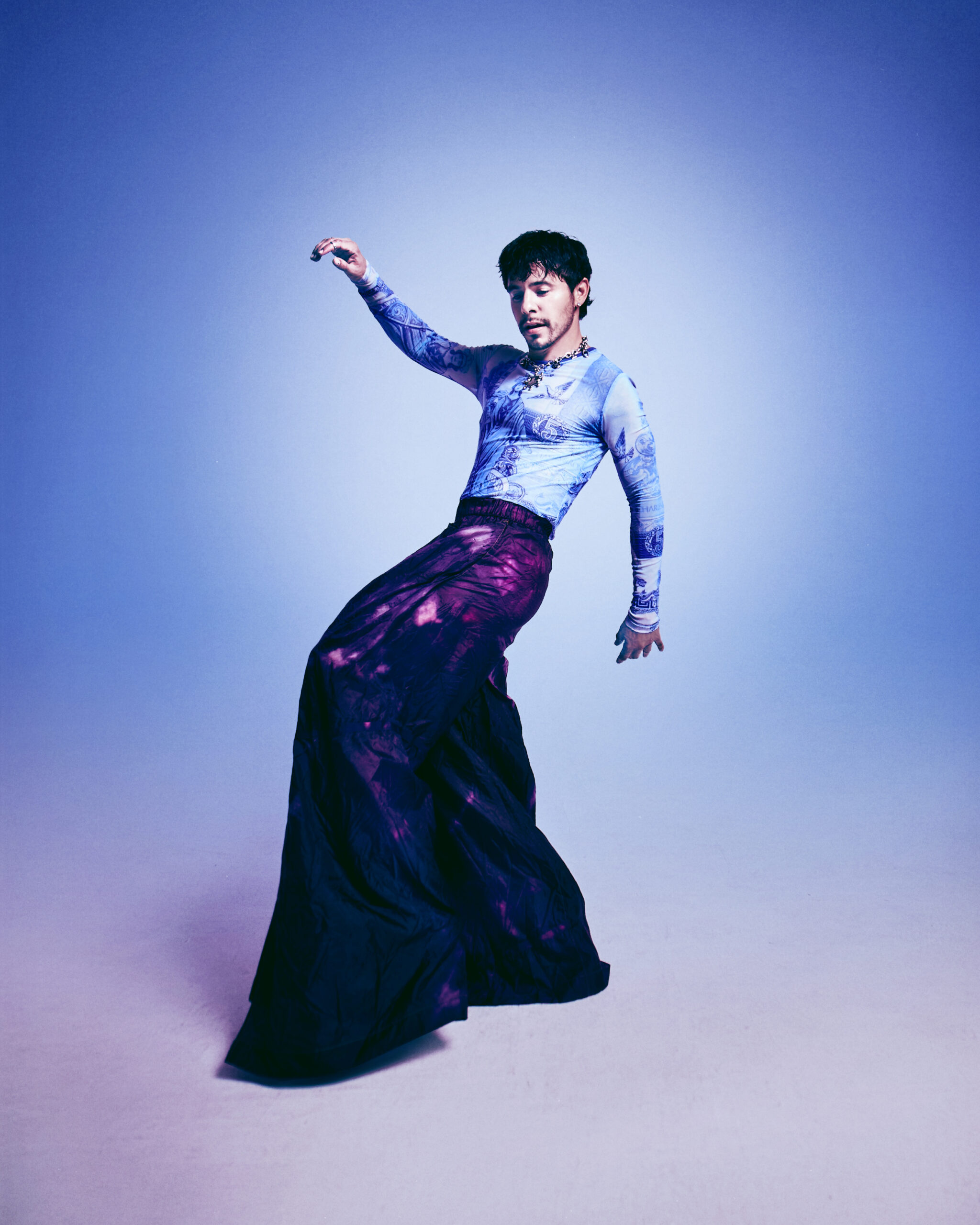
Top, Charles and Ron. Necklace, Vegan Tiger. Pants, Chereshnivska.
David: It was very scary. When I came out I also didn’t leave the church when I came out… that was something I was trying to reconcile because I was told many times you were chosen to… I mean as Mormons you’re told many are called…but few are chosen and the fact that you believe you were chosen even to have the beliefs of the Church of Jesus Christ of Latter-day Saints like being a Mormon like you were chosen and so you must live to the standard because it’s like I have this great treasure that I can’t take for granted. And on top of that, amongst my Mormon community, even the church leaders, I was always being told, you were chosen. You are such an example. You are a light. Yeah.
Loren: The pressure.
David: And so I thought, God, and I don’t know why he did, but he chose me to be the example amongst even Mormons to live the right way.
I had people saying David Archuletta is not married yet so I’m probably okay that I’m not married yet either because we’re the same age or well David Archuleta’s music’s okay he’s a Mormon so his music must be okay to listen to. So I’ve got to live the right way because I can’t let other people go astray. And if I do anything wrong, people are looking at me as an example. People would come up to me—I’d have people come up to me and be like, “I chose not to buy food on Sunday.” We were at the airport, and this guy was like, “Oh my gosh, David Archuleta, look, I packed my lunch because in stake conference, they were talking about how you chose not to eat out on Sunday, and so I wanted to follow your example.” And it was this grown man who was older than me, following David Archuleta’s example. They really did—like they wanted to take me out to eat on Sunday, and I was like, “No, I don’t want to because I have a commitment with my family that we won’t eat out on Sundays.” I wanted to keep this quiet, but that got out and was spoken about in a stake conference, and I had people saying David Archuleta is not married yet, so I’m probably okay that I’m not married yet either because we’re the same age. Or, well, David Archuleta’s music’s okay—he’s a Mormon, so his music must be okay to listen to.
Loren: Ok, on Sundays.
David: (laughs) Yeah.
Loren: Oh my gosh, the justification. I feel like you were probably seen in a similar way to a prophet because I feel like, if you see the prophet do it, then it must be okay. Or if the prophet’s listening to that on a Sunday, then it must be okay.
And I just can’t imagine the pressure of that, when you decided to come out, do you feel like you were, maybe alienating one community but being fully embraced by another community? Did that help that for you coming out for you?
David: Yeah. But I was also afraid of being embraced by the wrong community.
Loren: Because you probably framed them in a certain way in your mind as dangerous or something.
David: I thought I was entering the great and spacious building.
Loren: Yeah, right. I know all of these terms; it’s like a doctrine.
David: entering the great building that was going to collapse, tumble, and fall. And I was like, why would I want to go there? But when I got there—before I got there, the reason I came out was because I felt God say, “David, you do not see things the way I see them. And the way I see things is not the same as how many religious people see LGBTQ+ people.”
Loren: Yeah. Right.
David: He said, “You need to stop asking me to change you because there’s nothing that’s supposed to change.” And so then I thought, “Oh my gosh, is God telling me it’s time to reveal myself?” Maybe I’m being used to reveal to Mormons that being gay is okay, and… I wondered, is this my calling now? I see it very differently now because I don’t see that religion as the one true religion. I see a lot of beautiful things about the community and things that it taught me that are wonderful. The people are still wonderful, but a lot of the beliefs are just confusing—they’re very confusing.
Loren: Yeah, it’s a lot of things to unlearn, And I came to the place where I felt like if there is a God, he would want me to live authentically as long as I’m not hurting anyone, that feels like the meaning of life. And that probably feels more of a safe place now that you’re living authentically.
And something I wonder is now that you’re living authentically and have come out has that changed your writing process in terms of original music? What has that been like to write about different topics?
David: Yeah, I mean, now I can say whatever I want. I can swear. And I mean, I didn’t swear before. So now I can swear. I mean, I would swear even as a Mormon when I was driving—I would get road rage. It wasn’t until I was 27 that I said my first curse word. Now I can talk about sensuality, but I still feel like this Mormon wall is up. I’m not supposed to do this, like there’s a part of me always holding myself back because that was like the Mormon way, and I don’t really know.
I think I’m still learning how to let go a little bit, unravel some more. I’m curious, can I ask you—when you’re talking about “authentic”—I think it’s very clear to see visually when someone is queer, and then to live authentically…
Loren: Mhm.
David: But how was it for you? Why was leaving the church for you suddenly living authentically not as a queer person?
Loren: That’s such a good question. I feel like when you grow up religious, you’re taught that your inner voice should reflect like the God that you’re told exists. And leaving that behind, now I’m listening more to my intuition. And I actually associate intuition with God.
And so instead of being like, ” God thinks this way, so I need to be doing that.” I’m just trying to get more in tune with myself. And if I’m not hurting anyone, then there must be nothing wrong with me, or nothing wrong with it. and I don’t think gay people hurt anyone. They’re just living their truth. And I’m sure that you’re inside you, that’s where you felt like, no, I am gay. This is what I’m listening to and I can’t deny it. It’s like an inner voice that you can’t deny.
But when I’m speaking about authenticity, I mean just being unapologetically myself, not censoring myself because someone might think that’s annoying or weird or even in my writing and my music, just making sure that people aren’t living from a place of shame and having that inform how they act with other people. Just being yourself when you’re religious and you’re censoring yourself in that way even if you’re not you’re still kind of censoring yourself because you have a sense of shame so just getting rid of that shame in general so I think there are steps to authenticity like leaving the church that’s seems like an authentic choice for you and then even past getting rid of that programming there’s still ways to feel like your most authentic self and surround yourself with only people you can be your full self with, So that’s how I feel about that. We could talk forever.
David: That’s beautiful. I love that and you were saying censoring…When I was saying the wall, it’s that self censoring. And I love that you’ve been able to find to trust your intuition because I feel like in religion in general, not just Mormons, but yeah, Mormons, they teach you to not trust yourself. Your intuition,” Oh that’s wrong.” Because they want to be the one to tell you what’s right and wrong.
Loren: It’s like hijacking your intuition because I feel like, if you start to have doubts about something and you ask your bishop or whatever, they’ll say, I think that you need to pray about it. But what I’m praying to is actually my brainwashed intuition. So, it’s just going to reinforce whatever you brainwashed me with. I mean, I don’t want to say anything too controversial.
David: Yeah, because you…if you get an answer and it’s not the one they want, they’re like, “Keep praying. See if you can get the Spirit.” But it’s like, wait, but this is the Spirit. This is truth. But they don’t want you to have the truth. They want you to just go with their terms and conditions, even if it goes against who you are as a person or what really is, in the long run, the right thing to do, even sometimes.
Loren: You know, sometimes what was hard, the hardest part of leaving the church was to think about the people that I love and trust, for instance, family members, and realize that maybe they were wrong. And I know that when you left the church, your mom did leave the church, too. Was that something that took some of the suffering away from leaving, too? Did you have a fear that she would stay in the church and that would affect your relationship with her?
David: I was scared. That was one of the hardest things about coming out was disappointing everyone that I knew. I didn’t have queer friends of any sort. I worked with Ken, my publicist, and I was friends with Kevin McHale. They were the only gay people I was even in proximity to that weren’t closeted. When I had six people in my ward that suddenly came out to me which was very revealing to me.
Loren: Yeah, they’re everywhere.
David: Girls and guys were like, “David, oh my gosh!” Finally, they felt like they had an outlet, that they could speak to somebody in the church.
You were asking about my mom. My mom didn’t accept me and my decision when I first came out. She said, “David, I love you. I love God more, and I cannot accept this about you.” It was very testimonial, the way that…
Loren: Cuz she’s trying to do the right thing.
David: She thought by bearing her testimony, she thought that I would feel the spirit testify to me so that I could repent and come back. And I recognized that. I was like, “Mom, I literally believed that,” because she was like, “I testify that God’s plan is a man and woman to be married, this and that’s your eternal self plan.” And so I said, “Mom, I get it, I believed everything that you’re saying last week. So I was like, if it didn’t come to this point, I said I don’t need you to accept what I’m doing. I get it. I just need you to respect that I’m doing the best thing for me right now.”
I had to have a lot of hard conversations not only with her but with church leaders because when I came out I immediately got called into the church offices and I happened to be in Utah and…
Loren: How terrifying.
David: At the time there were a lot of people trying to help me come back to the light.
Loren: They just saw you as confused. Yeah, that’s something I’ve dealt with with my own family, realizing that we just can’t talk about certain things. So, it’s kind of put things on a superficial level to an extent.
I remember watching that interview of your mom on the Mormon Stories podcast and just crying because it’s just such a beautiful thing that she listened to you and that she was able to trust you. She chose her blood connection to her child over the church, and I know how big of a deal that is.
I just think your mom did such a good job in raising you, and she seems like such a wonderful person. I think her supporting you and your story is such an example to other queer members in the church that are trying to find the strength to talk to their family members and find themselves. I did want to ask about your cover of the George Michael song “Freedom” that came out yesterday. What about his story did you identify with, and what made you feel like you wanted to put your own spin on that song?
David: Okay. First off, that’s so moving, Loren, and so touching that you could hear my mom’s story. And I wish more people could have that situation because a lot of people don’t. Like you said, there are things you just can’t talk about because people do not want to change their mind.
Loren: Right.
David: They’re afraid that if they listen, they will be taken away from the right path and If they listen to a different opinion that will challenge their foundation and they’re afraid of everything crumbling. My mom was the same. She didn’t want to hear me. She was so afraid of her foundation falling apart.
Loren: Yeah. It’s part of their identity, too. It’s just so layered.
David: And so, it’s a very tricky thing for so many people. That’s why it’s hard to leave the church and make that decision. So, Loren, I’m so proud of you for having the strength to listen to yourself, even when it meant letting go of what connects you to everyone around you and your family. Your vector is a scary thing to let go.
Loren: Yeah.
David: And some people lose those relationships and other people are able to find that balance to live in harmony regardless of the differences.
Loren: Right. I know.
David: But yeah, I’m so glad that we found each other and…
Loren: I know. We have each other!
David: And now we’re karaoking together and stuff. My gosh, Can we talk about that too? How fun it was to do karaoke.
Loren: No, we should. I know. We went out to karaoke together in LA and…
David: with Parson.
Loren: I know! Parson James.
David: I didn’t know you knew him. That was so funny.

T-shirt, Diesel. Shorts, Weisheng Paris. Double chain cuff + chain necklace, Noritamy. Necklace, CAMP.Shoes, Dr. Martens.
Loren: Yeah, it’s such a small world. Yeah, we were doing Andrea Bocelli duets and what else did we do?
David: What’s Up, 4 Non Blondes!
Loren: Oh that was crazy. I know. We need to make this a regular thing. It’s our tradition now.
Loren: But yeah, I’m so obsessed with your voice. Just hearing it in person, it sounds already edited. I don’t know how you do it, but it’s flawless.
David: That’ s how I feel about you, it’s like I’m getting a neurological massage. You’re hitting the grooves of my brain that don’t usually get touched with your voice.
Loren: Wow, what a compliment. Thank you. Whoa.
David: It’s an experience. It was so fun to feel just the beautiful gift that you have while having a good time…
Loren: I feel the same way. No, it was everything. And we have to keep doing that. We also drove around in your car that you’ve had for how many years?
David: I’ve had it for 17 years. So, half of my life.
Loren: 17 years, and it’s still going strong. You played some of your new music, and I felt like this was a whole other side of you. It’s dance music. It’s sexy. You were incorporating… Am I not supposed to talk about these particular songs?
David: They’re not out yet, but you can talk about them…
Loren: Okay. I feel like you were tapping into a Spanish-speaking side—a little more party music. It was so fun, and I could just tell that it was the YOU that was waiting to break out. You know, I feel like it’s opened up a whole new world to you, and I just want to hear about…
David: (singing) “A whole new world!”
Loren: Oh, we did sing “A Whole New World”! Just like that writing process and your choice of covers, it’s coming from a brand-new place, right? How is this new era of your life informing what you write about and what songs you connect with, like the George Michael song “Freedom”?
David: So, yeah, going back to that and then I’ll answer the other question you said. because George Michael, I did not relate to him growing up. Because it was foreign. He’s singing about “I want your sex” and “I got to have faith.” I was like, that’s sacrilegious. Because he’s singing a song called “Faith”, but he’s saying, “I guess it would be nice if I could touch your body.”
Loren: Right. All in the same song.
David: Yeah. Yeah. “But I got to have faith.” I was like, oh… that’s not the way to have faith. “Like a little seed, plant it, and it’ll grow.” That’s how I saw faith. But when I came out, I listened to “Don’t Let the Sun Go Down on Me” on repeat so many times. It was like, I get what this song means now. Just to feel like you’re giving your all in life, and especially as an entertainer, you’re giving all to your audience to connect, and you’re just begging them, don’t let the sun go down on me just because I’m now showing all of who I am. It’s terrifying. You’re trying so hard to please and be something for everybody. I related to George and Elton on those. Especially listening to that, it was like my plea inside to my Mormon community to not let the sun go down on me. “Although I search myself, it’s always someone else I see. But losing everything is like the sun going down on me.” I was so terrified of losing everything for admitting who I was. So now, seeing freedom and George just own it… And heaven knows I was just a young boy. I didn’t know what I wanted to be.
And so he was talking about being a teenage star in Wham! And he’s like, I was every young school girl’s heart, pride, and joy. And he was like, I guess that was enough for me. But then he realized there’s so much more missing because I’m not being authentically myself. So now, getting to sing “Freedom” and pay homage to his legacy and just getting to say thank you for helping me feel seen even 35 years later from when he released the song.
Loren: Wow.
David: It was before I was born, but I feel seen in his music and now the songs I was showing you in the car. For me, it’s like I don’t have to hide that 10-year-old boy because the 10-year-old boy was a little fruity, but I had to censor myself. I had to mask in a way that I felt was approved because a lot of kids in school would call me names. I’d get called gay and a fag. I didn’t know what a fag meant. I didn’t know it was bad. But I knew it was meant to be discriminative. And so I was just like, “Okay, I’ve got to make sure that I’m as good of a Mormon boy as possible and put that wall up. Don’t let anything come out that’s not supposed to.” But this side of me that’s more feminine energy that I wasn’t allowed to express… and that adult… it’s sensuality, but I feel like it’s also, in a way, letting… I mean, 10-year-old me wasn’t talking about sex, but the 35-year-old version of me is… in a way that is freeing of that energy of expression.
So, it’s like freedom. And so, these songs are kind of like my version of “Freedom” by George Michael, where I can really be me, and that 10-year-old self that I had to hide for so long is here again. I’m reconnecting with him because he didn’t know it was bad. But when people would correct me and be like, “That’s gay. You’re not supposed to be that way,” I’d think, “Okay, I’m not supposed to be that way.” But I was just being me. It’s weird because there’s a little fluidity in sexuality, too, and attraction, so I like to hold space for that. I’m very excited about the new songs and just stepping into that freeing space.
Loren: I feel like just how he was making music from his authentic place that inspired people like you 35 years ago. I mean well from then you are creating music that will resonate with this community 35 years from now. So it’s just such a wonderful thing that you get to pass that torch on now that you’re creating music from a real place. And I also wondered, I know you’re coming out with your memoir. What was it like kind of reflecting back on your life in order to write your memoir? Do you feel like it was difficult to look back at that time or was it cathartic?
David: It was both for sure because there were a lot of things that I hadn’t dealt with that I was talking about part of my story, but then I would look at it and be like it would trigger something in me because little me didn’t make sense of what happened. And so back and I’m like, the reason why I’m here is because this happened. I would be like, my gosh, I’m like, I want to run away. I don’t want to write this book anymore. I don’t want to deal with this. I would be like, Why am I so afraid of these moments in my past? they already happened. Why am I so scared? And I had to sit with them. I’d have anxiety attacks. I’d have to lay down and do breathing exercises. I had to go to therapy.
Loren: Oh my god. Yeah.
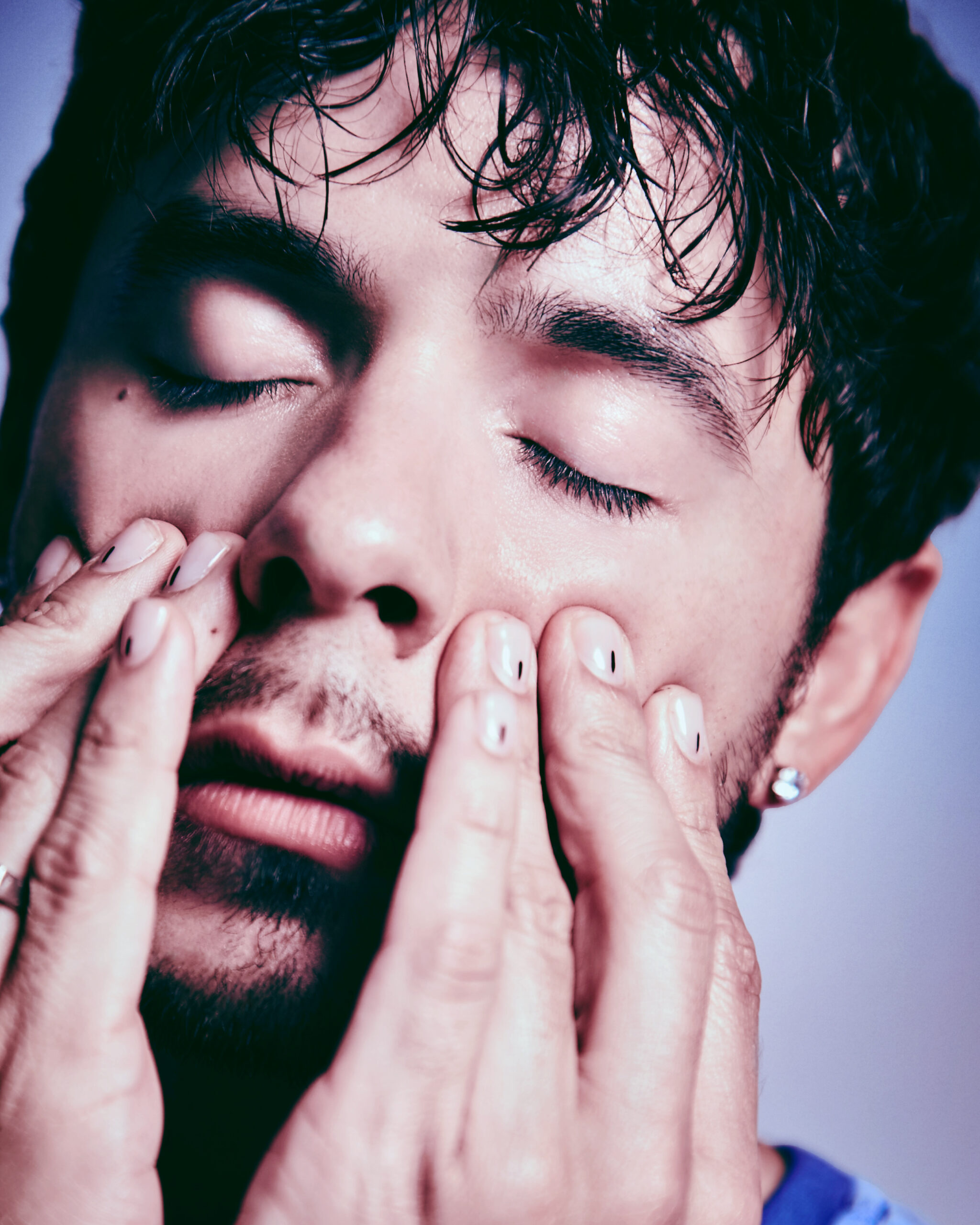
David: Because I was just like, I need to finish this book. And for my solution to not deal with those problems is don’t think about it, don’t talk about it. And so I was like, okay, I don’t want to write this book. But I also knew I’m like I have to deal with my hard emotions just like I had to deal with my hard emotions of queerness, being queer but I was like look how good it was to let that come forth. So this book has been a lot of that, including my journey of seeing my sexuality and I love Charlie Bird. There’s this guy Charlie Bird who was Mormon I think still is Mormon from what I understand, like he and his husband still go to church trying to prove you can still be in the church and queer and here and what I loved about his book is he said I’m gay but I identify as gay not just because of my sexuality he said for me gay is encompasses so many other things I have an eye for design, I love to dance. I feel empathetic. I have so many friends that are girls. I connect with them so well and he’s like, being gay, so many people only look at it as a sexual identity. And it’s not. It’s so many other things. And that just clicked to me because I was like, if I accept being gay queer or bisexual or any that means I’m accepting a sin. And for him, he was saying, “No, I’m gay.” He’s like, “Take out the sexuality of it.” “You’re only looking at who I’m attracted to.” He’s like, “Being gay is so many other parts of me.”
Loren: Right. Yeah.
David: He was known because he became a viral dancing BYU mascot in the Cougar for BYU.
Loren: Wow.
David: And he was going viral on ESPN. He’s like, “That’s my gay identity. My love for dance, art, and movement.” He’s like, “I wouldn’t be able to do that the way I can if I wasn’t gay.”
Loren: Right. Right.
David: And I was like, I feel the same way with my singing. There’s an emotion that comes with my queer identity. It’s not the sexuality of it. It is this energy of being able to pull from both the masculine and the feminine.
Loren: Yeah.
David: which allows you to express more intensely, more profoundly and deeply that other people just don’t have the capacity to, which is why they appreciate the performance arts that you can provide because they’re like, “You made me feel something.” But I’m so glad you can appreciate and feel that, too. Maybe that’s why you connect and so many queer people connect with you, Loren, because it’s like you have that depth that it’s not just their sexuality. It’s this space of profound emotion and empathy and expression that it’s that as well.
Loren: I wish that society would be inspired by queerness and the masculine and the feminine and the balance of those things because it’s just such a world of complexity. But I think because maybe religion has made society associate sex with shame, then the queer community has to bear the burden of people associating who they’re emotionally attracted to with the shame sex part of this weird ideology that society has. And I hope that we’re moving in a direction that the queer community doesn’t have to bear that burden. but yeah, the bravery of you and other people in the public eye that are dealing with this are really the trailblazers to get us to that point. And it’s such a beautiful thing.
So, you’re an example to me and so many other people that grew up Mormon or grew up queer, and it’s just such a beautiful thing to be able to explore where you’re at in your journey and let you share that with us. So thank you!
David: Thank you Loren.
Loren: Is there anything that you wanted to make sure to talk about before we finish?
David: I guess I just wanted to say that this book—so much of what we talk about, I do talk about it. And it truly feels like my freedom, like George Michael’s song Freedom. That’s how this book feels to me more than anything. Because more than my singing, I feel my strength when I get to share my story and my experience.
Loren: Yeah.
David: Music is a way to do that, and this book is another. So, I’m just excited to let people see, I’m hoping that especially the Mormon community. I mean, it’s not a Mormon book, definitely not. I’m just hoping that people will be able to read it and be like how queer people aren’t much different from them and David tried hard to be straight. It’s like, I tried hella hard to be straight and a good Mormon boy so it’ll be interesting to just share that journey with people of my attempt at that.
Loren: Yeah.There’s only so much you can say in a three minute song. So, it’s nice to be able to expand on your experience and hopefully have those people that were thinking you were confused read your story and realize that you did everything you could possibly do and you reached a place that you are happy and it’s probably even more beautiful than you imagined, right?
David: Yeah! Can I just say one last thing, too? You were talking about community, and I thought about how I was afraid of being embraced by the wrong community—a bad, maybe even an evil community. But I feel so much comfort here. I finally feel understood in a way I never felt in the community where I grew up. I spent my whole life trying so hard to fit in, and I did. I found joy, but my walls were always up, even in my supposed safe space. Now, I’ve gone somewhere where I don’t have to put up a front. I don’t know how to live without a front. How do I take it off? I’ve only ever known how to have a front and my walls up, so how do I take them down? And what will I be like without them? I don’t know. But it feels good to be around people and not feel judged.
Loren: And it’s not like this new community is like “come to the dark side.” It’s just all these people like you thought you were the alien and then when you come to this other side you realize all of these other people felt exactly the same way and now you can finally hang out and talk about it.
David Alonzo: Yeah! Oh my gosh. Yeah.
Loren Allred: It’s a beautiful thing. Well, I’m so happy for you. I’m so excited to see what you do next. And I’ve had your cover on repeat and it’s so good. You gave it a whole new life.
David: Thank you, Loren.
Loren: I love you.
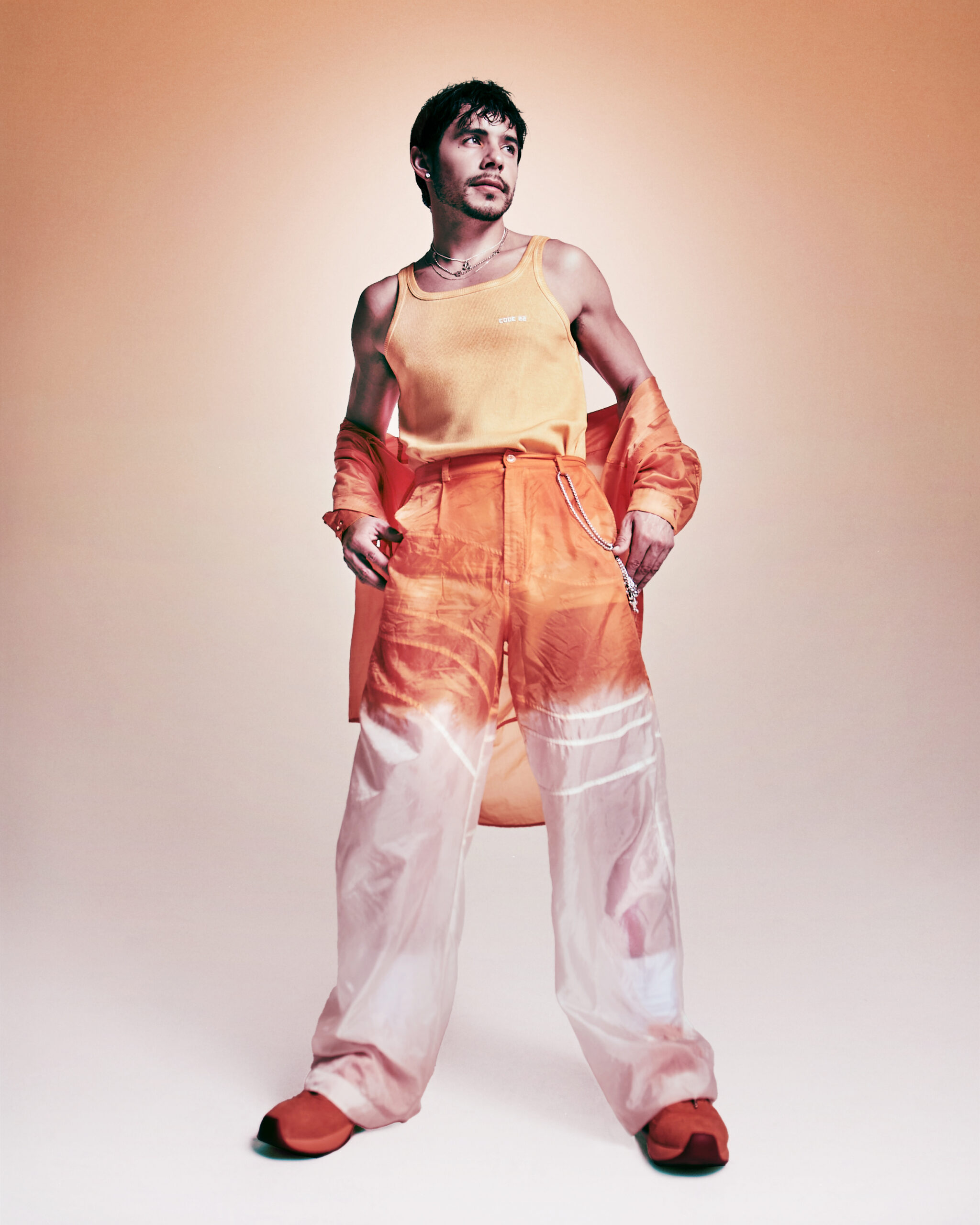
Look, Chereshnivska. Tank, Code 22. Shoes, Freshy. Cherry Heart and Flower Chain Necklace, Rat Betty.
